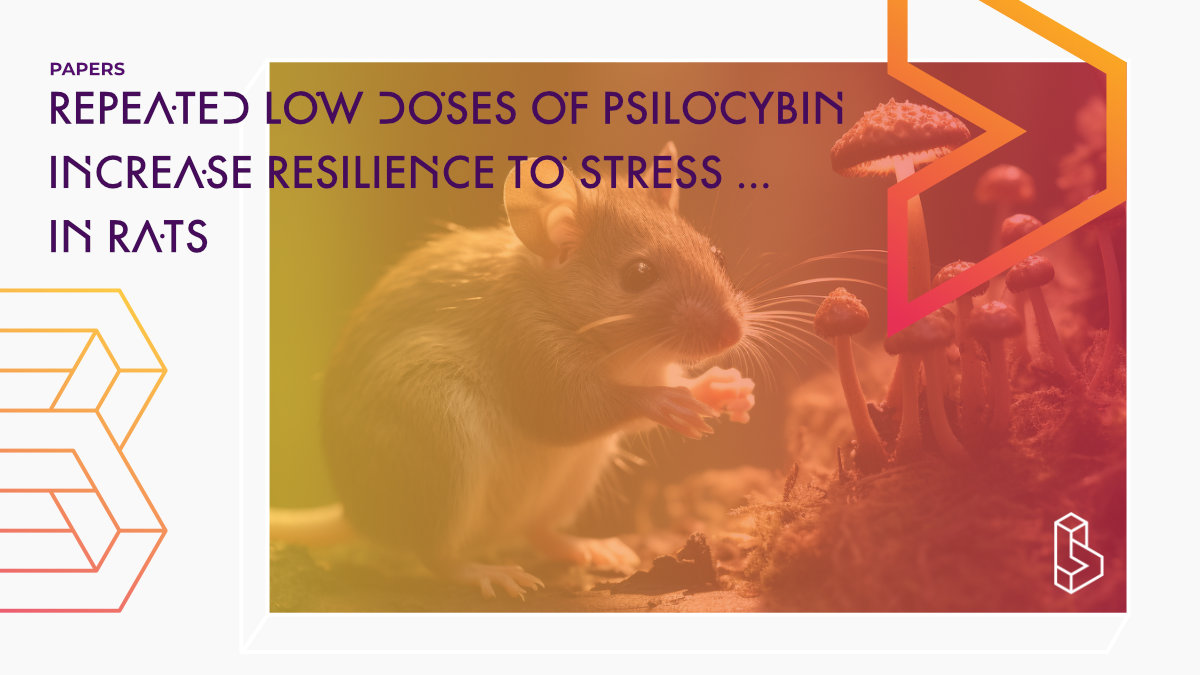This preclinical study using rats established and validated a regimen for psilocybin microdosing, administering repeated low doses of psilocybin at a level below the psychedelic threshold. The rats tolerated the regimen well without showing signs of anhedonia, anxiety, or altered locomotor activity. Additionally, the treatment imparted resilience against stress, reduced self-grooming behaviours associated with compulsiveness, and increased 5-HT7 receptor expression and synaptic density in the paraventricular nucleus of the thalamus.
Abstract of Repeated low doses of psilocybin increase resilience to stress, lower compulsive actions, and strengthen cortical connections to the paraventricular thalamic nucleus in rats
“Psilocybin (a classic serotonergic psychedelic drug) has received appraisal for use in psychedelic-assisted therapy of several psychiatric disorders. A less explored topic concerns the use of repeated low doses of psychedelics, at a dose that is well below the psychedelic dose used in psychedelic-assisted therapy and often referred to as microdosing. Psilocybin microdose users frequently report increases in mental health, yet such reports are often highly biased and vulnerable to placebo effects. Here we establish and validate a psilocybin microdose-like regimen in rats with repeated low doses of psilocybin administration at a dose derived from occupancy at rat brain 5-HT2A receptors in vivo. The rats tolerated the repeated low doses of psilocybin well and did not manifest signs of anhedonia, anxiety, or altered locomotor activity. There were no deficits in pre-pulse inhibition of the startle reflex, nor did the treatment downregulate or desensitize the 5-HT2A receptors. However, the repeated low doses of psilocybin imparted resilience against the stress of multiple subcutaneous injections, and reduced the frequency of self-grooming, a proxy for human compulsive actions, while also increasing 5-HT7 receptor expression and synaptic density in the paraventricular nucleus of the thalamus. These results establish a well-validated regimen for further experiments probing the effects of repeated low doses of psilocybin. Results further substantiate anecdotal reports of the benefits of psilocybin microdosing as a therapeutic intervention, while pointing to a possible physiological mechanism.”
Authors: Kat F. Kiilerich, Joe Lorenz, Malthe B. Scharff, Nikolaj Speth, Tobias G. Brandt, Julia Czurylo, Mengfei Xiong, Naja S. Jessen, Agata Casado-Sainz, Vladimir Shalgunov, Celia Kjaerby, Grzegorz Satała, Andrzej J. Bojarski, Anders A. Jensen, Matthias M. Herth, Paul Cumming, Agnete Overgaard & Mikael Palner
Summary of Repeated low doses of psilocybin increase resilience to stress, lower compulsive actions, and strengthen cortical connections to the paraventricular thalamic nucleus in rats
Introduction
The serotonergic psychedelic prodrug psilocybin has received increasing attention in recent years for the treatment of depression, end-of-life anxiety, and substance use disorders. Despite the lack of evidence-based findings on the efficacy and safety of chronic psychedelic microdosing, increasing numbers of people are testing this approach for psychotherapeutic purposes.
Psilocybin microdosing is repeated low doses of psilocybin, which are around 10% of the commonly applied psychoactive dose of 25 mg. Such doses have behavioral and pharmacological effects, therefore not being microdoses as defined in pharmaceutical terms.
Find this paper
https://doi.org/10.1038/s41380-023-02280-z
Paywall | Google Scholar | Backup | 🕊
Cite this paper (APA)
Kiilerich, K. F., Lorenz, J., Scharff, M. B., Speth, N., Brandt, T. G., Czurylo, J., ... & Palner, M. (2023). Repeated low doses of psilocybin increase resilience to stress, lower compulsive actions, and strengthen cortical connections to the paraventricular thalamic nucleus in rats. Molecular psychiatry, 1-13.
Study details
Compounds studied
Psilocybin
Topics studied
Anxiety
Microdosing
Study characteristics
Animal Study

